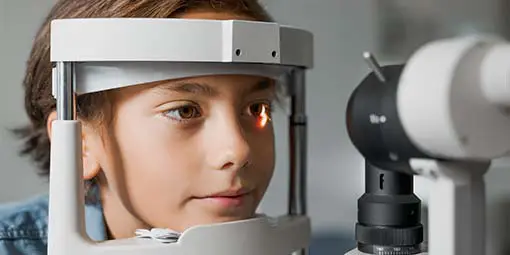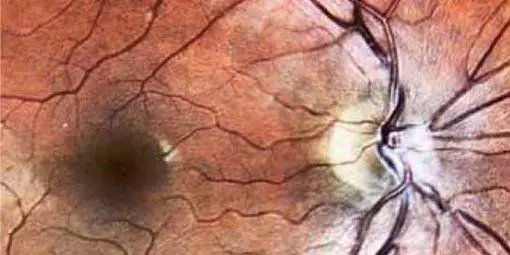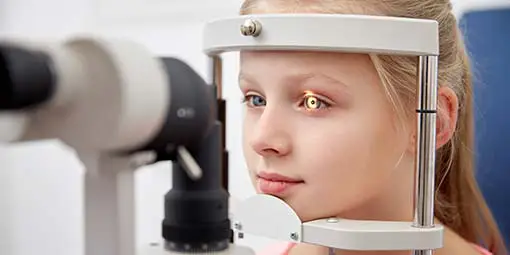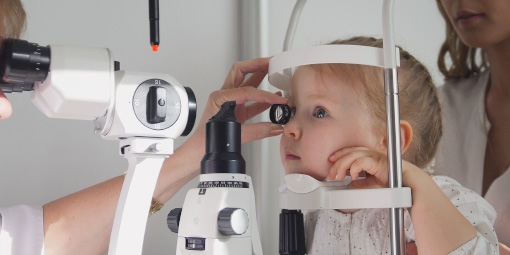The Importance Of Pediatric Eye Care
19-05-2025
Pediatric Eye Care Promotes Development
Clear Vision Supports Learning and Growth
It is crucial for parents and caregivers to understand and appreciate the importance of pediatric eye care. Pediatric eye care is the comprehensive examination, treatment, and management of children's eyes, starting from infancy through to adolescence. It involves a variety of assessments to evaluate visual system development and health, identify eye diseases and disorders, and to facilitate their prompt treatment in support of healthy vision and proper childhood development over the long term.Pediatric eye care begins with a routine eye exam for infants shortly after birth to rule out any congenital eye conditions, such as cataracts, strabismus (crossed eyes), or amblyopia (lazy eye). Pediatric eye exams are generally recommended beginning at six months of age. After that, a child should have their eyes checked annually by our Edmonton pediatric optometrists, especially if they have a family history of vision problems, or if they demonstrate signs of visual difficulties, such as squinting, rubbing their eyes, or holding objects too close to their face.
Early Detection of Disorders Is Key
Early Eye Exams Safeguard Visual Development
One of the essential aspects of pediatric eye care is the early detection and management of eye diseases and disorders. Early diagnosis and treatment of eye disorders in children are critical to ensuring optimal visual outcomes and childhood learning. The importance of early detection of eye disease and disorders is underscored by the statistic that 80% of early learning is visual. Most eye conditions, such as amblyopia, are easiest to treat during the early stages of a child's visual development. However, if left untreated, they can cause long-term vision problems, including permanent vision loss. Moreover, some children are born with cataracts, requiring their lens to be replaced and aphakic contact lenses pursued to provide the clear vision needed for proper childhood development.Apart from congenital eye conditions, many visual problems can develop later in childhood, such as nearsightedness (myopia), farsightedness (hyperopia), and astigmatism. These conditions can affect a child's ability to see clearly, learn, and participate in physical activities. Myopia, in particular, can increase health risks later in life. Optometrist-guided myopia management can slow the progression of myopia and significantly decrease these risks. Annual comprehensive child eye exams promote the early detection of these problems and enable early intervention through the prescription of corrective lenses, which can significantly improve a child's vision, leading to better academic performance and overall well-being.
Promoting Child Eye Health At Home
Education and Healthy Habits
Pediatric eye care also includes education and guidance for parents and caregivers on how to care for their children's eyes. Simple measures, such as ensuring adequate lighting, limiting screen time, and encouraging outdoor activities, can promote good eye health and prevent vision problems. Our optometrists can also advise parents on the importance of a healthy diet, which is essential for maintaining good vision. Foods rich in vitamins A, C, and E, such as leafy greens, carrots, and citrus fruits, are particularly beneficial for eye health.Child-Friendly Eye Care in Edmonton
Trusted Edmonton Pediatric Optometrists
Another critical aspect of pediatric eye care is providing a child-friendly environment during eye exams. Many children may feel anxious or scared during an eye exam, particularly if it is their first time. Our Edmonton optometrists and eye care staff are trained to make the experience as comfortable and stress-free as possible for children. This can involve using specialized diagnostic equipment designed for pediatric patients, such as lights and toys, and using age-appropriate language to explain the tests and procedures.Pediatric eye care is essential for healthy childhood development and the overall well-being of children. A comprehensive eye exam can identify potential problems and prevent long-term vision problems that can affect child development and academic performance. Regular eye exams can also detect common visual problems, such as nearsightedness and farsightedness, and provide early intervention, such as corrective eyeglass lenses. Our Edmonton optometrists can also provide guidance on simple measures to promote good eye health, such as limiting screen time and encouraging a healthy diet. Parents and caregivers should prioritize pediatric eye care by scheduling regular eye exams for their children and ensuring they are seen by our eye doctors who specialize in pediatric care. It is also essential to observe and report any signs of visual difficulties, such as squinting, rubbing eyes, or holding objects too close to their face, to ensure early intervention and treatment.
Schedule An AppointmentFYEyes Blog Posts

How much is a kids eye exam in Alberta?
Learn what eye care services the Alberta Health Care Insurance Plan covers.

10 Important Eye Care Tips For Children
Tips for children to keep their eyes healthy and their vision clear.

Importance of Advanced Eye Exam Technologies
Advanced eye exam technologies promote the early detection of eye diseases.

Clear Vision: The Key to Unlocking Academic and Athletic Success For School-Age Children
A clear path to academic success begins with clear vision.

Adult Eye Exams
Our advanced eye exams consist of 25+ modern tests and digital scans to assess eye health, function, and visual acuity.

Child Eye Exams
Give your child a clear future with an annual eye exam from our experienced Edmonton optometrists.

Senior Eye Exams
Maintain your vision through your golden years with gold standard eye care from the optometrists at our Edmonton eye clinic.

Contact Lens Eye Exams
Our eye exams for contact lens wearers include test and digital scans to assess eye health, function, visual acuity, and lens fit.

Diabetic Eye Exams
Managing diabetes requires regular eye exams to ensure that diabetes is not causing irreversible vision loss.

Dilated Eye Exams
Dilating the eyes enables our Edmonton optometrists to see more of the eye so that you many never see less.
Our Edmonton Eye Exams Are Comprised Of 4 Phases Of Evaluation

1. Eye Exam Pre-Testing
Corneal Thickness | Intraocular Pressures | Visual Field
Pre-testing is a detailed process that gathers all necessary information for the optometrist in advance of the optometrist-administered eye examination. This process involves completing a detailed patient history, as well as a series of standard tests. Pre-testing is an essential part of the comprehensive eye exam process, providing valuable information and visuals for both the optometrist and the patient.
More About Pre-Testing »
2. Advanced Diagnostic Testing
Retinal Photography, OCT, Topography
eye-deology Vision Care differentiates itself from other clinics by having the most advanced modern diagnostic specialty testing equipment. Specialty equipment, such as a wide-angle high-resolution retinal imager, Optical Coherence Tomography (OCT), Humphrey Visual Field Analyzer and corneal topographer, ensures that patients receive the best comprehensive eye care.
More About Advanced Testing »
3. Optometrist Examination
Health Assessment & Disease Diagnosis
eye-deology Vision Care Edmonton optometrists perform a multitude of tests and assessments to evaluate ocular health, eye coordination, and visual acuity. In addition, they also evaluate the results of the tests and scans performed during pre-testing. As part of patient education, our optometrists also take the time to show and explain results to patients.
More About Doctor Exam »
4. Eye Glass Consult
Prescription | Lens Selection | Digital Fitting
If you require corrective lenses to improve your vision, our licensed opticians will customize their fit to your unique attributes, needs, lifestyle, and budget. Our opticians are happy to provide you with information about the latest eyeglass frame and lens technologies available so you can make informed decisions and begin seeing and looking your best.
More About Eyewear Consult »